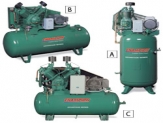Why do you need an air compressor? If you already know the answer to that question, then what kind do you need? Air compressors come in many shapes and sizes and they are designed for different things. This report will help you choose the right one. There are regular home air compressors and then there are industrial-size units for factories and smaller commercial unit is used by professional painters and mechanics.
How do air compressors work?
The fundamentals of different air compressors are the same. An air compressor forces air through a hose and keeps it going in one direction so you can have increased air pressure for different applications. Compressed air is a very powerful force-powerful enough to drive nails, break lug nuts and even lift small elevators.
Practical applications for the homeowner include inflating car tires, basketballs and other odd jobs. Larger units drive air tools and can boost the functionality of hydraulic-based machines. An example of this type would be a small freight elevator in a small commercial building. Smaller buildings might not have conventional elevators for moving freight. A hydraulic elevator avoids the need for ceiling mounted cable-and-motor apparatus and can be driven by an air compressor.
More details about air compressors-what different features mean
- Most air compressors are electric, though gasoline-powered units are available for use in places where there is no power supply.
- Air compressors generally have horsepower ratings and CFM (Cubic Feet per Minute) ratings. The CFM rates matters much more-it’s the true measure of how powerful the compressor is.
- Compressors have an air tank. The size of the air tank determines how much reserve power the compressor has. If your work application depletes the back-up air supply faster than the compressor can boost it, then you need a bigger tank or a more-powerful compressor that can keep up with what you are doing. Larger units, of course, will be less portable. Higher CFM beats a bigger tank.
- Oil and oil-free compressors-which is right for you? Most larger units are lubricated-meaning they contain oil internally like a car engine. There are also oil-free units. Oil-free units are cleaner, especially for jobs such as spray-painting. Oil-lubricated compressors emit a constant, fine mist of oil which can cause trouble in painting applications. In many cases, however, the mist can be channeled into a catch bottle. Lubricated compressors have a longer lifespan and are generally the better choice for heavy, long-term use. The downside to oil-based units is that they can only be used on level surfaces-a luxury in many commercial applications such as construction or drilling. They also require periodic oil changes, a messy job that means downtime. Non-lubricated units are virtually maintenance free.
An air compressor of any size is a sizable investment. Think long-term, since any decent unit will last a long time. It may be better to buy a larger unit and have you operation grow into it. If you’re certain your operation will stay small, than a smaller unit may do the job and save you some cash.
Sources:
Tech Talk-Hinsdale Public Library, Hinsdale, IL
https://www.hinsdalelibrary.info/wp-content/uploads/2009/05/tech-talk-air-compressors.pdf
Popular Mechanics-Air Compressor-How It Works
https://www.popularmechanics.com/home/improvement/energy-efficient/1275131
